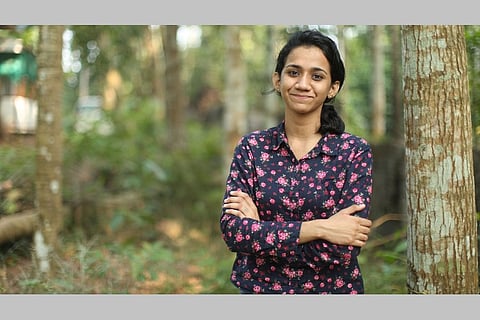

‘Me, The Change’ is The Quint’s campaign for the first-time women voter who has an achievement to her name, however big or small. As part of the campaign, The Quint is accepting nominations for these young women achievers and showcasing these stories. If you know someone who fits the bill, let us know by emailing at methechange@thequint.com.
I was given the name ‘Mariam Rauf’ and after finding hardly any information online, I landed up in a brick-red school building in Kottayam, Kerala to find her. Even before she arrived, the principal, teachers and the students were singing praises of their ‘Mariam Miss.’ And just then a young woman in a yellow kurti walked in with a sweet smile on her face. As she entered the kindergarten class, the kids yelled in excitement.
Twenty-two-year-old Mariam Rauf is a Personal Safety Educator. Apart from sex education, she also teaches students about body safety.
She became a popular name when she started a petition on Change.org asking for Personal Safety Education (PSE) to be made compulsory in all government schools in Kerala. The petition, addressed to Kerala State Commission for Protection of Child Rights (KeSCPCR) and Education Minister C Raveendranath, had over 39,000 signatures (at the time of writing this article).
Today, she stands as a confident, independent woman lending a helping hand to every person in pain, but her journey was riddled with a lot of trauma. From the age of three until 14, she was abused by three different men. It was at the age of 19, that she remembered her suppressed trauma.
“All of a sudden, I had this very clear memory... whole bunch of memories, actually. That there was a shopkeeper, a family member and there was a doctor. All three have sexually abused me.”
Mariam then confronted her abusers. She says one of the most important things a person who has been traumatised needs to know is – don’t blame yourself, hold the abuser accountable for his/her actions.
“On one side, your brain is...being acknowledged. Your memory is being acknowledged. This has happened. You’re not imagining anything. You’re not nuts. And the reason why you felt so bad and hurt all these years, it makes sense. Somebody you care for, somebody you trust has done this to you and they’ve admitted it. That’s very important. It’s a huge step in healing,” she says.
“A child has to grapple with things, you know – ‘Was I not a good kid? Why did it happen? How could they do it to me?’ Cause it’s somebody you love and care for.”
Mariam says it’s important to be aware of one’s own bodies, adding that we shouldn’t be ashamed of any body parts and give private parts the right names. She says parents should believe what their child says because children don’t make things up about sexual abuse.
She recollects an incident of how a woman had once taught her daughter that her vagina was a flower and that she shouldn’t allow anyone to pluck it. Once when the child was abused, she ran to her mother saying, ‘Uncle plucked my flower.’ The mother forgot the euphemism she had taught and it took a while before she could comprehend what was happening with her child.
“Most importantly, stranger danger is a myth, alright? Strangers are not the ones who are abusing kids. Mostly they are people you know or the kids know.”
So what can you do? You can create a space for your kids to approach you and you can tell your kids about body safety rules and tell them that they can say NO, they can GO, TELL you about it and that you will listen to them.
As a first time voter, Mariam’s only demand is to make personal safety education compulsory in schools.
“All I am asking is that in the hundreds of hours that a kid is in school in a year, just to take two to three hours. Just a couple of sessions out of the whole number of school days to teach them personal safety and life skills,” she says.
This article was originally published on The Quint.